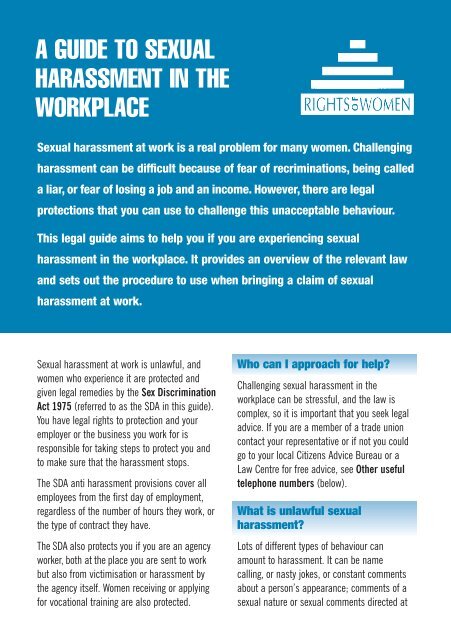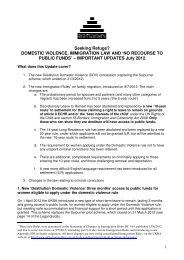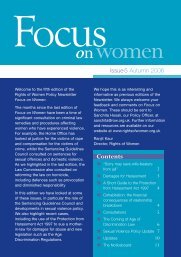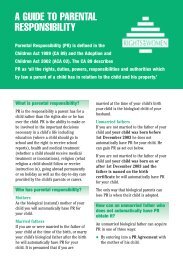Sexual Harassment in the workplace - Rights of Women
Sexual Harassment in the workplace - Rights of Women
Sexual Harassment in the workplace - Rights of Women
You also want an ePaper? Increase the reach of your titles
YUMPU automatically turns print PDFs into web optimized ePapers that Google loves.
A guide to sexuAl<br />
hArAssment <strong>in</strong> <strong>the</strong><br />
workplAce<br />
<strong>Sexual</strong> harassment at work is a real problem for many women. Challeng<strong>in</strong>g<br />
harassment can be difficult because <strong>of</strong> fear <strong>of</strong> recrim<strong>in</strong>ations, be<strong>in</strong>g called<br />
a liar, or fear <strong>of</strong> los<strong>in</strong>g a job and an <strong>in</strong>come. However, <strong>the</strong>re are legal<br />
protections that you can use to challenge this unacceptable behaviour.<br />
This legal guide aims to help you if you are experienc<strong>in</strong>g sexual<br />
harassment <strong>in</strong> <strong>the</strong> <strong>workplace</strong>. It provides an overview <strong>of</strong> <strong>the</strong> relevant law<br />
and sets out <strong>the</strong> procedure to use when br<strong>in</strong>g<strong>in</strong>g a claim <strong>of</strong> sexual<br />
harassment at work.<br />
<strong>Sexual</strong> harassment at work is unlawful, and<br />
women who experience it are protected and<br />
given legal remedies by <strong>the</strong> Sex Discrim<strong>in</strong>ation<br />
Act 1975 (referred to as <strong>the</strong> SDA <strong>in</strong> this guide).<br />
You have legal rights to protection and your<br />
employer or <strong>the</strong> bus<strong>in</strong>ess you work for is<br />
responsible for tak<strong>in</strong>g steps to protect you and<br />
to make sure that <strong>the</strong> harassment stops.<br />
The SDA anti harassment provisions cover all<br />
employees from <strong>the</strong> first day <strong>of</strong> employment,<br />
regardless <strong>of</strong> <strong>the</strong> number <strong>of</strong> hours <strong>the</strong>y work, or<br />
<strong>the</strong> type <strong>of</strong> contract <strong>the</strong>y have.<br />
The SDA also protects you if you are an agency<br />
worker, both at <strong>the</strong> place you are sent to work<br />
but also from victimisation or harassment by<br />
<strong>the</strong> agency itself. <strong>Women</strong> receiv<strong>in</strong>g or apply<strong>in</strong>g<br />
for vocational tra<strong>in</strong><strong>in</strong>g are also protected.<br />
Who can I approach for help?<br />
Challeng<strong>in</strong>g sexual harassment <strong>in</strong> <strong>the</strong><br />
<strong>workplace</strong> can be stressful, and <strong>the</strong> law is<br />
complex, so it is important that you seek legal<br />
advice. If you are a member <strong>of</strong> a trade union<br />
contact your representative or if not you could<br />
go to your local Citizens Advice Bureau or a<br />
Law Centre for free advice, see O<strong>the</strong>r useful<br />
telephone numbers (below).<br />
What is unlawful sexual<br />
harassment?<br />
Lots <strong>of</strong> different types <strong>of</strong> behaviour can<br />
amount to harassment. It can be name<br />
call<strong>in</strong>g, or nasty jokes, or constant comments<br />
about a person’s appearance; comments <strong>of</strong> a<br />
sexual nature or sexual comments directed at
a woman; it can be bully<strong>in</strong>g through<br />
management; or even refus<strong>in</strong>g to speak to<br />
someone, or ignor<strong>in</strong>g <strong>the</strong>m. In some cases<br />
physical contact, sometimes constant touch<strong>in</strong>g,<br />
or pett<strong>in</strong>g, or even violent physical abuse such<br />
as push<strong>in</strong>g, or shout<strong>in</strong>g, or throw<strong>in</strong>g books will<br />
amount to harassment.<br />
In order for conduct to be unlawful sexual<br />
harassment, it must be unwanted conduct that<br />
falls <strong>in</strong>to one <strong>of</strong> <strong>the</strong> two categories described<br />
by <strong>the</strong> SDA.<br />
The first type is any unwanted conduct which is<br />
related to a woman be<strong>in</strong>g a woman. This can<br />
be harassment if <strong>the</strong> conduct has <strong>the</strong> purpose<br />
or <strong>the</strong> effect <strong>of</strong> ei<strong>the</strong>r violat<strong>in</strong>g her dignity, or<br />
has <strong>the</strong> effect <strong>of</strong> creat<strong>in</strong>g an environment for<br />
her which is <strong>in</strong>timidat<strong>in</strong>g or hostile or<br />
degrad<strong>in</strong>g or humiliat<strong>in</strong>g or <strong>of</strong>fensive.<br />
This type <strong>of</strong> harassment <strong>in</strong>cludes actions such<br />
as:<br />
l name call<strong>in</strong>g, for example, call<strong>in</strong>g someone<br />
a stupid woman or a typical woman<br />
l references to women’s work or abilities<br />
l rudeness to women on <strong>the</strong> team; ignor<strong>in</strong>g<br />
women and listen<strong>in</strong>g to male workers<br />
l undervalu<strong>in</strong>g <strong>the</strong> contribution <strong>of</strong> women<br />
l mak<strong>in</strong>g sexist jokes<br />
The second type <strong>of</strong> unlawful sexual harassment<br />
is any unwanted verbal or non verbal or<br />
physical conduct <strong>of</strong> a sexual nature.<br />
This can be harassment if it has <strong>the</strong> purpose or<br />
effect <strong>of</strong> ei<strong>the</strong>r violat<strong>in</strong>g a woman’s dignity, or<br />
has <strong>the</strong> effect <strong>of</strong> creat<strong>in</strong>g an environment for<br />
her which is <strong>in</strong>timidat<strong>in</strong>g or hostile or degrad<strong>in</strong>g<br />
or humiliat<strong>in</strong>g or <strong>of</strong>fensive.<br />
This type <strong>of</strong> harassment <strong>in</strong>cludes:<br />
l direct sexual remarks – comments about a<br />
woman’s body or looks<br />
l sexist jokes<br />
l <strong>the</strong> display <strong>of</strong> sexist or pornographic<br />
material<br />
l sexual touch<strong>in</strong>g, p<strong>in</strong>ch<strong>in</strong>g, or patt<strong>in</strong>g<br />
l sexual <strong>in</strong>nuendo or suggestions<br />
<strong>Sexual</strong> harassment may also <strong>in</strong>clude<br />
treatment such as demand<strong>in</strong>g that women<br />
take clients to a lap danc<strong>in</strong>g or a burlesque<br />
club.<br />
What is unwanted conduct?<br />
This simply means conduct or behaviour<br />
that is not <strong>in</strong>vited or welcomed by a<br />
woman. The conduct will be unwanted if a<br />
woman f<strong>in</strong>ds it hostile or unpleasant, whe<strong>the</strong>r<br />
she says so at <strong>the</strong> time or not.<br />
Does <strong>the</strong>re have to be more than<br />
one comment made or lots <strong>of</strong><br />
unwanted conduct?<br />
No. Although <strong>the</strong>re <strong>of</strong>ten will be lots <strong>of</strong><br />
different occasions when someone makes<br />
remarks or comments, or is rude or <strong>of</strong>fensive,<br />
even a one <strong>of</strong>f remark can amount to unlawful<br />
harassment. Whe<strong>the</strong>r or not it is will depend<br />
upon what is said or done, and <strong>the</strong><br />
circumstances.<br />
Does <strong>the</strong> harasser have to <strong>in</strong>tend<br />
to harass me? What if he says<br />
that it was only a joke?<br />
<strong>Harassment</strong> can be deliberate and <strong>in</strong>tentional<br />
but it does not have to be. Just because <strong>the</strong><br />
person does not mean to harass you does not<br />
mean that you will not f<strong>in</strong>d <strong>the</strong>m or <strong>the</strong>ir<br />
remarks hostile, <strong>in</strong>timidat<strong>in</strong>g or degrad<strong>in</strong>g.<br />
A woman is protected at work from unwanted<br />
conduct or behaviour if <strong>the</strong> conduct has <strong>the</strong><br />
effect <strong>of</strong> mak<strong>in</strong>g her <strong>workplace</strong> hostile, or
<strong>in</strong>timidat<strong>in</strong>g, even if <strong>the</strong> person whose<br />
conduct is caus<strong>in</strong>g <strong>the</strong> problem doesn’t mean<br />
any harm, or has no idea that <strong>the</strong>y are<br />
caus<strong>in</strong>g <strong>of</strong>fense. The SDA is concerned with<br />
both <strong>the</strong> effect <strong>of</strong> un<strong>in</strong>tentional conduct and<br />
deliberate harassment. This means that, as<br />
long as a woman is not unreasonably<br />
sensitive, if she is upset or <strong>of</strong>fended or f<strong>in</strong>ds<br />
comments or jokes degrad<strong>in</strong>g she can ask for<br />
<strong>the</strong> person to stop, even if <strong>the</strong>y are made<br />
<strong>in</strong>nocently and with no <strong>in</strong>tention <strong>of</strong> <strong>of</strong>fend<strong>in</strong>g<br />
anyone.<br />
I am be<strong>in</strong>g subjected to sexual<br />
harassment – what should I do?<br />
Step 1: Show that <strong>the</strong> behaviour is<br />
unwanted<br />
Step 2: Report <strong>the</strong> behaviour to a<br />
manager<br />
Step 3: Report <strong>the</strong> behaviour to<br />
your employer as a formal<br />
grievance<br />
<strong>Women</strong> are entitled to work with dignity, <strong>in</strong> an<br />
environment which is nei<strong>the</strong>r hostile nor<br />
<strong>in</strong>timidat<strong>in</strong>g, and if any conduct <strong>of</strong> o<strong>the</strong>rs<br />
means <strong>the</strong> <strong>workplace</strong> is hostile for <strong>the</strong><br />
woman <strong>the</strong>n she has <strong>the</strong> right not to put up<br />
with it.<br />
Show that <strong>the</strong> behaviour is<br />
unwanted<br />
To make it clear to everyone that <strong>the</strong> conduct<br />
is unwanted, a woman who experiences<br />
harassment or comments should, if possible,<br />
tell <strong>the</strong> person mak<strong>in</strong>g <strong>the</strong> comments or be<strong>in</strong>g<br />
unpleasant to stop, and why. If possible, you<br />
should tell <strong>the</strong> person how <strong>the</strong>ir behaviour<br />
makes you feel or how it affects you and also<br />
tell <strong>the</strong> person that it is harassment.<br />
Do I have to make it clear that I<br />
do not want <strong>the</strong> behaviour to<br />
cont<strong>in</strong>ue?<br />
Strictly speak<strong>in</strong>g, you do not have to compla<strong>in</strong><br />
or tell anyone <strong>in</strong> order for <strong>the</strong> conduct to have<br />
<strong>the</strong> effect <strong>of</strong> harass<strong>in</strong>g you. However, if you<br />
th<strong>in</strong>k that you may want to take legal action,<br />
<strong>the</strong>n it is important to consider compla<strong>in</strong><strong>in</strong>g to<br />
both <strong>the</strong> harasser and your employers as soon<br />
as you can. You could get support from a friend,<br />
a work colleague or a trade union<br />
representative.<br />
Report <strong>the</strong> behaviour to a<br />
manager<br />
If show<strong>in</strong>g <strong>the</strong> person that <strong>the</strong> conduct is<br />
unwanted does not make <strong>the</strong>m stop, or if you<br />
f<strong>in</strong>d it too difficult to confront <strong>the</strong> person, you<br />
could tell a senior person <strong>in</strong> <strong>the</strong> <strong>workplace</strong> and<br />
ask <strong>the</strong>m to tell him or her to stop, or you could<br />
report directly to your employer us<strong>in</strong>g a formal<br />
harassment policy or grievance procedure.<br />
Your employer is legally responsible for ensur<strong>in</strong>g<br />
that you are safe at work, and that you are not<br />
subjected to any form <strong>of</strong> discrim<strong>in</strong>ation. They are<br />
responsible for <strong>the</strong> actions <strong>of</strong> all employees and<br />
even some customers or third parties, even if<br />
<strong>the</strong>y do not encourage or support <strong>the</strong> harassment.<br />
If you make a compla<strong>in</strong>t <strong>of</strong> harassment, <strong>the</strong><br />
employer should take steps to stop <strong>the</strong> person<br />
who is caus<strong>in</strong>g <strong>the</strong> harassment. This might<br />
<strong>in</strong>volve simply speak<strong>in</strong>g to <strong>the</strong> person, or it<br />
might <strong>in</strong>volve tak<strong>in</strong>g formal discipl<strong>in</strong>ary action<br />
aga<strong>in</strong>st <strong>the</strong> person. In most work places<br />
harassment <strong>of</strong> ano<strong>the</strong>r member <strong>of</strong> staff will be<br />
misconduct under <strong>the</strong> contract <strong>of</strong> employment,<br />
and if proved, may lead to <strong>the</strong> harasser be<strong>in</strong>g<br />
moved to ano<strong>the</strong>r <strong>workplace</strong>, or even<br />
dismissed.
Use a formal grievance procedure<br />
If rais<strong>in</strong>g <strong>the</strong> matter <strong>in</strong>formally does not end<br />
<strong>the</strong> harassment, or if you are asked to use a<br />
formal procedure to make a compla<strong>in</strong>t, you<br />
could raise <strong>the</strong> matter under a harassment<br />
policy or grievance procedure. Many employers<br />
will have a policy or procedure to deal with<br />
harassment, which will set out clearly <strong>the</strong><br />
steps to be taken by someone who believes<br />
<strong>the</strong>y are be<strong>in</strong>g harassed. If your employer does<br />
have such a policy, you should ask for a copy,<br />
or if you have a trade union representative or<br />
o<strong>the</strong>r <strong>workplace</strong> representative, ask <strong>the</strong>m to<br />
help you get a copy. If your employer does not<br />
have a formal policy deal<strong>in</strong>g with harassment,<br />
<strong>the</strong>y may have a grievance procedure, and you<br />
should try to use this <strong>in</strong>stead.<br />
If your employer does not have any sort <strong>of</strong><br />
compla<strong>in</strong>ts or grievance procedure, <strong>the</strong>n you<br />
should put your compla<strong>in</strong>t <strong>in</strong> writ<strong>in</strong>g to a senior<br />
manager and ask <strong>the</strong>m to deal with it as a<br />
grievance. If <strong>the</strong> employer does not deal with<br />
your compla<strong>in</strong>t, or you are not happy with <strong>the</strong><br />
way <strong>the</strong>y have dealt with it, ask if you can<br />
appeal aga<strong>in</strong>st <strong>the</strong> decision <strong>the</strong>y have reached.<br />
It is very important to realise that <strong>in</strong> order for<br />
you to take a compla<strong>in</strong>t to an Employment<br />
Tribunal you must first make a compla<strong>in</strong>t to<br />
your employer us<strong>in</strong>g a formal grievance<br />
procedure as set by ACAS guidel<strong>in</strong>es (see<br />
below for more detail).<br />
I am worried that no one will<br />
believe me<br />
This is a common fear, particularly as many<br />
harassers make sure that <strong>the</strong>y only make<br />
comments or remarks or only touch a woman<br />
when no one else is around. If this happens to<br />
you, you should try, if possible to avoid be<strong>in</strong>g<br />
alone with <strong>the</strong> person or try to get witnesses.<br />
Of course, if you work toge<strong>the</strong>r, this may be<br />
impossible.<br />
If no one else has heard or seen <strong>the</strong> comments<br />
or remarks, and you th<strong>in</strong>k that you are be<strong>in</strong>g<br />
bullied or harassed it is a good idea to keep a<br />
diary <strong>of</strong> <strong>the</strong> th<strong>in</strong>gs which upset you and what<br />
you have said and what you have done about<br />
it. This can be shown to your employer, and to<br />
an Employment Tribunal (see below) if<br />
necessary, to support your allegations and to<br />
help you remember what happened and when.<br />
When you are upset it can be very difficult to<br />
remember what happened, and writ<strong>in</strong>g it down<br />
on a regular basis can help.<br />
If <strong>the</strong> harassment you experience causes you<br />
to become ill you may want to seek support<br />
from your GP. If you tell <strong>the</strong>m what is<br />
happen<strong>in</strong>g, <strong>the</strong>y can also support your<br />
compla<strong>in</strong>t, with medical evidence.<br />
If I compla<strong>in</strong>, I am worried that I<br />
will lose my job, or not be<br />
promoted, or treated badly by <strong>the</strong><br />
person I compla<strong>in</strong> about<br />
Although <strong>the</strong> law protects women from<br />
victimisation, many women have real and<br />
valid concerns that <strong>the</strong>y will be victimised if<br />
<strong>the</strong>y compla<strong>in</strong> about harassment. It is a good<br />
idea to get some support from a trade union or<br />
a friend or colleague at work before rais<strong>in</strong>g<br />
your concerns, if you are worried about this.<br />
Unlawful victimisation occurs when an<br />
employer or ano<strong>the</strong>r person work<strong>in</strong>g for <strong>the</strong><br />
employer treats an employee less favourably<br />
than <strong>the</strong>y would do because <strong>the</strong> employee has<br />
made a compla<strong>in</strong>t about discrim<strong>in</strong>ation,<br />
<strong>in</strong>clud<strong>in</strong>g harassment, or because <strong>the</strong>y believe<br />
that <strong>the</strong> person is go<strong>in</strong>g to make a compla<strong>in</strong>t.
The compla<strong>in</strong>t can be an <strong>in</strong>ternal one or one to<br />
an Employment Tribunal. It is also unlawful to<br />
victimise someone because <strong>the</strong>y give evidence<br />
on behalf <strong>of</strong> someone who compla<strong>in</strong>s <strong>of</strong><br />
discrim<strong>in</strong>ation.<br />
If you th<strong>in</strong>k that you have been victimised, you<br />
should compla<strong>in</strong> about this <strong>in</strong> writ<strong>in</strong>g to your<br />
employer who should deal with it as a<br />
grievance, and if necessary by us<strong>in</strong>g <strong>the</strong><br />
discipl<strong>in</strong>ary procedure to deal with <strong>the</strong> person<br />
who has victimised you.<br />
If you are not happy with <strong>the</strong> way your<br />
employer has dealt with it, you can compla<strong>in</strong><br />
to an Employment Tribunal <strong>of</strong> unlawful<br />
discrim<strong>in</strong>ation by way <strong>of</strong> victimisation.<br />
Can I take my compla<strong>in</strong>t to<br />
court?<br />
Yes. If you compla<strong>in</strong> to your employer and <strong>the</strong>y<br />
decide that what has happened does not<br />
amount to harassment, and you th<strong>in</strong>k <strong>the</strong>y<br />
have not made <strong>the</strong> right decision, you can<br />
make a claim to an Employment Tribunal (an<br />
ET). The ET will <strong>the</strong>n decide whe<strong>the</strong>r as a<br />
matter <strong>of</strong> law your treatment is unlawful<br />
harassment or not.<br />
The ET will make a decision about whe<strong>the</strong>r or<br />
not what you have experienced amounts to<br />
harassment by consider<strong>in</strong>g <strong>the</strong> surround<strong>in</strong>g<br />
circumstances such as <strong>the</strong> comments made,<br />
how <strong>the</strong>y were said, what o<strong>the</strong>r people thought<br />
about <strong>the</strong>m, and how <strong>the</strong>y affected you, and<br />
whe<strong>the</strong>r or not any behaviour ought to be<br />
considered to be harassment. In mak<strong>in</strong>g this<br />
decision, both <strong>the</strong> employer and <strong>the</strong> ET must<br />
take particular and specific account <strong>of</strong> what<br />
<strong>the</strong> woman who makes <strong>the</strong> compla<strong>in</strong>t says<br />
about <strong>the</strong> treatment. The SDA provides that<br />
<strong>the</strong> views <strong>of</strong> <strong>the</strong> woman who is compla<strong>in</strong><strong>in</strong>g <strong>of</strong><br />
be<strong>in</strong>g harassed are <strong>of</strong> particular importance <strong>in</strong><br />
decid<strong>in</strong>g whe<strong>the</strong>r it is harassment or not.<br />
If it is found that you did experience sexual<br />
harassment <strong>the</strong> ET can make a declaration<br />
that you were discrim<strong>in</strong>ated aga<strong>in</strong>st or can<br />
make a recommendation about your harasser<br />
and how <strong>the</strong>y should be dealt with.<br />
Additionally, if you are not happy with <strong>the</strong> way<br />
that your employer has dealt with your<br />
concerns, or if you have lost your job, or if you<br />
have experienced ill health through stress or<br />
depression as a result, you may want to seek<br />
compensation by mak<strong>in</strong>g a compla<strong>in</strong>t to <strong>the</strong> ET.<br />
If <strong>the</strong> ET f<strong>in</strong>ds that you have been unfairly<br />
dismissed because <strong>of</strong> <strong>the</strong> harassment, or<br />
because you made a compla<strong>in</strong>t, <strong>the</strong> ET could<br />
order your employer to re<strong>in</strong>state you, if that is<br />
what you want. The ET can also award you<br />
compensation for <strong>in</strong>jury to your feel<strong>in</strong>gs, for<br />
psychological harm or for any f<strong>in</strong>ancial losses<br />
you have experienced.<br />
What do I have to prove?<br />
The ET must look at <strong>the</strong> facts and <strong>the</strong>n<br />
consider whe<strong>the</strong>r your employer is liable<br />
(responsible) for <strong>the</strong> sexual harassment you<br />
experienced. They must consider whe<strong>the</strong>r <strong>the</strong><br />
<strong>in</strong>cident took place ‘<strong>in</strong> <strong>the</strong> course <strong>of</strong> your<br />
employment’. For example, did <strong>the</strong> <strong>in</strong>cident<br />
take place dur<strong>in</strong>g work hours or on work<br />
premises? This could <strong>in</strong>clude an <strong>in</strong>cident which<br />
occurs dur<strong>in</strong>g a work social event. This is<br />
known as your employer’s ‘vicarious<br />
liability’.<br />
The ET will also consider whe<strong>the</strong>r <strong>the</strong> sexual<br />
harassment could have been prevented or<br />
controlled. This is known as your employer’s<br />
‘direct liability’. It is possible that an<br />
employer may try to avoid liability for what has
happened to you by say<strong>in</strong>g that it is just your<br />
harasser who is responsible. For this reason<br />
you should seek legal advice about whe<strong>the</strong>r<br />
your claim to <strong>the</strong> ET should be lodged as<br />
aga<strong>in</strong>st both your employer and your harasser.<br />
When should I make a compla<strong>in</strong>t<br />
to <strong>the</strong> ET?<br />
You must send your claim to <strong>the</strong> Employment<br />
Tribunal with<strong>in</strong> three months <strong>of</strong> <strong>the</strong> <strong>in</strong>cident or<br />
<strong>in</strong>cidents <strong>of</strong> harassment you are compla<strong>in</strong><strong>in</strong>g<br />
about. This means that if <strong>the</strong> last comment or<br />
joke which upset you was made on <strong>the</strong> 12th<br />
January 2010, you must make sure that your<br />
claim form reaches <strong>the</strong> ET <strong>of</strong>fice by 11th April<br />
2010. If you do not claim <strong>in</strong> time, you may not<br />
be able to pursue <strong>the</strong> claim at all.<br />
If you have experienced a long period <strong>of</strong><br />
harassment, <strong>the</strong> three months may start from<br />
<strong>the</strong> last <strong>in</strong>cident, but you must still file your<br />
claim with<strong>in</strong> three months.<br />
Before mak<strong>in</strong>g a claim you should raise your<br />
compla<strong>in</strong>t by mak<strong>in</strong>g a formal grievance with<br />
your employer. This is a formal requirement<br />
and if you do not raise a grievance, and w<strong>in</strong><br />
your claim, your damages may be reduced<br />
because <strong>of</strong> this. Your damages can also be<br />
reduced if you do not appeal aga<strong>in</strong>st an <strong>in</strong>itial<br />
decision by your employer that you were not<br />
harassed.<br />
Advice and <strong>in</strong>formation is available from <strong>the</strong><br />
Advisory Conciliation and Arbitration<br />
Service (ACAS) which sets out basic m<strong>in</strong>imum<br />
standards for employers and employees <strong>in</strong><br />
try<strong>in</strong>g to resolve disputes <strong>in</strong> <strong>the</strong> <strong>workplace</strong><br />
before go<strong>in</strong>g to Tribunal. The Code <strong>of</strong> Practice<br />
(and accompany<strong>in</strong>g Guide) can be found on <strong>the</strong><br />
ACAS website www.acas.org.uk and can be<br />
downloaded for a small fee. Alternatively <strong>the</strong><br />
Code can be downloaded free <strong>of</strong> charge from<br />
www.emplaw.co.uk/content/<strong>in</strong>dex.<br />
It is crucial that you comply with <strong>the</strong> Code if<br />
you th<strong>in</strong>k that you may wish to make a<br />
claim to <strong>the</strong> Employment Tribunal.<br />
How do I make a compla<strong>in</strong>t to <strong>the</strong><br />
ET?<br />
You must use a standard form to make your<br />
compla<strong>in</strong>t. These are available from <strong>the</strong><br />
Employment Tribunal website www.employment<br />
tribunals.gov.uk and can be filled <strong>in</strong> onl<strong>in</strong>e.<br />
There is also an Employment Tribunal public<br />
enquiry l<strong>in</strong>e on 08457 959775. You can also<br />
get a paper copy to be filled <strong>in</strong> by hand from<br />
some Jobcentres, Law Centres and Citizens<br />
Advice Bureaux.<br />
You should give details <strong>of</strong> all <strong>the</strong> <strong>in</strong>cidents and<br />
matters which you are compla<strong>in</strong><strong>in</strong>g about, and<br />
should state that you are compla<strong>in</strong><strong>in</strong>g about<br />
harassment under <strong>the</strong> Sex Discrim<strong>in</strong>ation Act<br />
1975.<br />
Once a claim is submitted a copy is sent to<br />
your employer for a Response to be filed with<strong>in</strong><br />
28 days. The Tribunal will <strong>the</strong>n set a hear<strong>in</strong>g<br />
date for your case and notify you <strong>of</strong> this. In<br />
complex cases a case management or o<strong>the</strong>r<br />
hear<strong>in</strong>g may be held before a f<strong>in</strong>al hear<strong>in</strong>g to<br />
discuss what needs to be prepared for <strong>the</strong> f<strong>in</strong>al<br />
hear<strong>in</strong>g. It is important to comply with any<br />
directions <strong>the</strong> Tribunal makes <strong>in</strong> order to avoid<br />
hav<strong>in</strong>g your claim struck out or be<strong>in</strong>g ordered<br />
to pay extra costs.<br />
Questionnaires<br />
The SDA 1975 enables you to send a special<br />
questionnaire to your employer. This can be an<br />
important way <strong>of</strong> ga<strong>in</strong><strong>in</strong>g valuable <strong>in</strong>formation
which may assist your case. It is an optional<br />
step and <strong>the</strong> questionnaire is quite complex, so<br />
it is recommended that you seek legal advice.<br />
What can I expect from <strong>the</strong> ET<br />
hear<strong>in</strong>g?<br />
You will be expected to attend <strong>the</strong> hear<strong>in</strong>g date<br />
and give evidence <strong>in</strong> front <strong>of</strong> a Tribunal panel.<br />
If you have any witnesses to <strong>the</strong> harassment<br />
<strong>the</strong>y may also be required to give evidence.<br />
The proceed<strong>in</strong>gs are not private and most ET<br />
hear<strong>in</strong>gs are open to <strong>the</strong> public. However,<br />
where a case <strong>in</strong>volves allegations <strong>of</strong> sexual<br />
misconduct <strong>the</strong> ET can make an order which<br />
stops <strong>the</strong> press from nam<strong>in</strong>g <strong>in</strong>dividuals until<br />
<strong>the</strong> ET issues its written decision.<br />
Public fund<strong>in</strong>g (<strong>of</strong>ten known as legal aid) is not<br />
available for representation at an ET. You will<br />
have to <strong>the</strong>refore pay privately for legal<br />
representation or represent yourself at <strong>the</strong><br />
hear<strong>in</strong>g. However you may be entitled to legal<br />
assistance via your union and/or under a<br />
household contents <strong>in</strong>surance policy, or you<br />
may wish to obta<strong>in</strong> advice from a local Citizens<br />
Advice Bureau (CAB), Law Centre or <strong>the</strong><br />
Equality and Human <strong>Rights</strong> Commission.<br />
Sometimes a Citizens Advice Bureau or Law<br />
Centre can refer you to organisations such as<br />
<strong>the</strong> Free Representation Unit (FRU) for free<br />
legal representation at your ET hear<strong>in</strong>g. See<br />
O<strong>the</strong>r useful telephone numbers (below).<br />
<strong>Harassment</strong> outside work<br />
If you have been harassed outside your<br />
<strong>workplace</strong>, for example if you have received<br />
threaten<strong>in</strong>g phone calls or letters, you may be<br />
able to report <strong>the</strong> matter to <strong>the</strong> police.<br />
Alternatively you could apply for an <strong>in</strong>junction<br />
aga<strong>in</strong>st your harasser and claim damages<br />
under <strong>the</strong> Protection from <strong>Harassment</strong> Act<br />
1997. Fur<strong>the</strong>r <strong>in</strong>formation can be obta<strong>in</strong>ed<br />
from <strong>the</strong> <strong>Rights</strong> <strong>of</strong> <strong>Women</strong> advice l<strong>in</strong>e (see<br />
below). You could also read <strong>Rights</strong> <strong>of</strong> <strong>Women</strong>’s<br />
legal guides A guide to domestic violence<br />
<strong>in</strong>junctions and Report<strong>in</strong>g an <strong>of</strong>fence to <strong>the</strong><br />
police: a guide to crim<strong>in</strong>al <strong>in</strong>vestigations<br />
available on our website.<br />
O<strong>the</strong>r types <strong>of</strong> discrim<strong>in</strong>ation<br />
You may also have claims under race, religion,<br />
age, disability or trade union legislation if <strong>the</strong><br />
harassment you have experienced is because<br />
<strong>of</strong> one <strong>of</strong> <strong>the</strong>se factors.<br />
The law relat<strong>in</strong>g to sexual harassment is<br />
complex and we have provided a very basic<br />
overview <strong>of</strong> <strong>the</strong> term<strong>in</strong>ology, law and ET<br />
practice and procedure. We would strongly<br />
advise any woman consider<strong>in</strong>g br<strong>in</strong>g<strong>in</strong>g a<br />
claim for sexual harassment to seek legal<br />
advice by contact<strong>in</strong>g a solicitor, her trade<br />
union or one <strong>of</strong> <strong>the</strong> organisations listed<br />
below.<br />
Please note that <strong>the</strong> law as set out <strong>in</strong> this legal guide is <strong>the</strong> law as it stood at <strong>the</strong><br />
date <strong>of</strong> publication. The law may have changed s<strong>in</strong>ce <strong>the</strong>n and accord<strong>in</strong>gly you<br />
are advised to take up to date legal advice. <strong>Rights</strong> <strong>of</strong> <strong>Women</strong> cannot accept<br />
responsibility for any reliance placed on <strong>the</strong> legal <strong>in</strong>formation conta<strong>in</strong>ed <strong>in</strong> this<br />
legal guide. This legal guide is designed to give general advice only.<br />
© <strong>Rights</strong> <strong>of</strong> <strong>Women</strong> July 2010
For free, confidential legal advice on family law <strong>in</strong>clud<strong>in</strong>g domestic<br />
violence, divorce and relationship breakdown, children and contact<br />
issues call <strong>the</strong> <strong>Rights</strong> <strong>of</strong> <strong>Women</strong> Advice L<strong>in</strong>e on 020 7251 6577<br />
(telephone) or 020 7490 2562 (textphone). The advice l<strong>in</strong>e is open on<br />
Tuesdays, Wednesdays and Thursdays 2pm – 4pm and 7pm – 9pm and<br />
Fridays 12 noon – 2pm.<br />
For free legal advice on sexual violence, <strong>the</strong> crim<strong>in</strong>al law, and<br />
immigration and asylum issues please call our <strong>Sexual</strong> Violence Advice<br />
L<strong>in</strong>e on 020 7251 8887 (telephone) or 020 7490 2562 (textphone).<br />
The advice l<strong>in</strong>e is open on Mondays 11am – 1pm and Tuesdays 10am –<br />
12 noon.<br />
O<strong>the</strong>r useful telephone numbers<br />
ACAS 0845 747 4747 www.acas.org.uk<br />
(Advisory Conciliation and Arbitration Service)<br />
Community Legal Advice 0845 345 4345 www.communitylegaladvice.org.uk<br />
(for <strong>in</strong>formation and f<strong>in</strong>d<strong>in</strong>g a solicitor )<br />
EHRC 0845 604 6610 www.equalityhumanrights.com<br />
(Equality and Human <strong>Rights</strong> Commission)<br />
Law Centres Federation 020 7842 0720 www.lawcentres.org.uk<br />
(to f<strong>in</strong>d a local law centre)<br />
Law Society 020 7242 1222 www.lawsociety.org.uk<br />
Trade Union Congress<br />
(and l<strong>in</strong>ks to <strong>the</strong> worksmart website)<br />
Pay and Work <strong>Rights</strong> Helpl<strong>in</strong>e 0800 917 2368<br />
Citizens Advice Bureau<br />
www.tuc.org.uk<br />
www.citizensadvice.org.uk<br />
<strong>Rights</strong> <strong>of</strong> <strong>Women</strong>, 52-54 Fea<strong>the</strong>rstone Street, London EC1Y 8RT<br />
Office/Adm<strong>in</strong>: 020 7251 6575 Textphone: 020 7490 2562<br />
Fax: 020 7490 5377 Email: <strong>in</strong>fo@row.org.uk<br />
Website: www.rights<strong>of</strong>women.org.uk<br />
Industrial and Provident Society No: 23221R<br />
Funded by London Councils

















